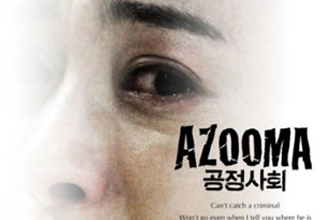""Can't catch a criminal. Won't go even when I tell you where he is. Can't chase him when he runs...
What the hell do you want me to do?!"
Synopsis:
Having separated from her celebrated dentist husband, Dr Lee - for whom she used to work as a dental assistant - insurance saleswoman Young-nam (Jang Young-nam) does her utmost to balance work responsibilities with the raising of her ten-year-old daughter, Yeon-ju (Kim Jee-hee); in spite of receiving no help or even moral support from him, save a financial outlay. When a business meeting over-running results in her being unable to pick Yeon-ju up from school on time, Young-nam is distraught to find that her daughter isn't waiting where she should be when she finally goes to collect her. Getting no answer from her daughter's cellphone either, Young-nam immediately goes to the police station but is summarily dismissed and told to go home and wait, as her daughter will likely "turn up" safe and sound. Paying no attention to the 'advice', she begins to search for Yeon-ju herself eventually finding her blood-soaked and unconscious lying in the street; the child having been the victim of kidnap and rape.
However, though Young-nam repeatedly pleads with the detective assigned to the case to make catching the criminal a priority, she is met with a virtual brick wall of lectures about timing, police procedure and protocol, and calls to her husband reach a largely uncaring individual only interested in protecting his celebrity image.
Increasingly convinced that the culprit will escape unpunished unless immediate action is taken and utterly determined to ensure he pays in full for what he did to her daughter, Young-nam sets out to search for him on her own. The question is, what she'll be able (or prepared) to do if and when she finds him...
 |
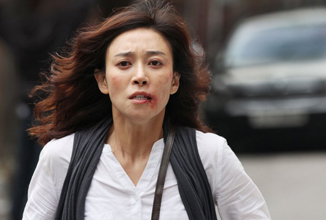 |
Review:
Azooma begins in brutal form with a vicious physical altercation between Young-nam and the man she believes is 'the criminal', seemingly over a black holdall. Somewhat reminiscent in violent tone to the opening scene from Yang Ik-jun's 'Breathless' - albeit from a female focus rather than male (those who have seen both films will hopefully know exactly what I mean) - director Lee Ji-seung straight away begins to underline the character traits that not only make Young-nam the person she is but also compel her to rail against extraneous injustices and wrongdoings; gradually pushing her from desperation through increasing feelings of frustration to, ultimately, thoughts of cold-blooded revenge by her own hand.
Throughout this visceral fight in the very first moments of the film, Young-nam resolutely refuses to give in or let go of the holdall or let the man escape in spite of being repeatedly slapped, punched, kicked, sworn at in terms derogatory to any female, thrown against walls and to the ground - even managing to bite her assailant and stab him with a hypodermic dental needle in the midst of her 'torture' - and when she is finally left almost semi-conscious at the side of the road she still pulls herself up again and continues in pursuit of the absconding criminal.
In short, in Young-nam we continually see female strength in the face of male-assumed patriarchy (almost implied to be inbuilt) and though at this early stage of proceedings we are as yet unaware of the full state of play, this theme, which will later play a significant role, has already been clearly stated; even if that fact only becomes wholly apparent in hindsight.
Throughout the entire subsequent running time of Azooma, Young-nam's interactions are, for the vast majority of the time, with male figures of authority who continually and almost exclusively refer to her as "ajumma" - a word literally meaning "aunt" but most commonly used as a polite (and generic) term for "married woman"; hence the film's English language title - thereby repeatedly not only objectifying her as just another (hysterical) female but also to a large degree reducing her from a specific individual to just another one of numerous nameless statistics; especially considering the fact that her daughter has become the latest victim in an ever-increasing list of child abuse cases. Even the somewhat sympathetic Detective Ma (played by Don Lee) is guilty of such inferences; on more than one occasion accusing Young-nam's meddling in police affairs as messing up everything he and his colleagues are trying to do and advising her to concentrate on looking after her daughter which, if you will, as a woman he feels is her responsibility and even, by implication, her place.
In fact there are only two instances in the entirety of Azooma where Young-nam is referred to by name - once called Ms Yoon by Dr Lee, in a flashback to the days when she was a young woman beginning a career as a dental technician; and in the other referred to as Mrs Lee by a lawyer (notably female) pointing out the almost folly of Young-nam seeking justice for the terrible ordeal suffered by her daughter. However, even in the latter of these, the female-to-female discussion between Young-nam and the lawyer, the statement of the shocking statistics relating to the capture and punishment (or not) of child molesters in Korea serves to underline the fact that Young-nam's problems are not just those of an individual but of Korean society, as a whole.
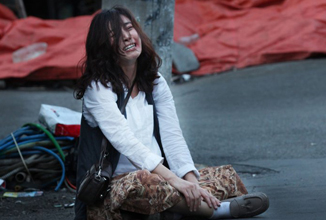 |
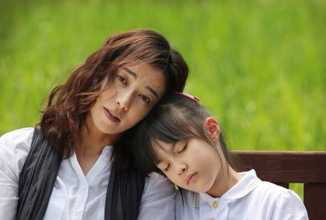 |
All of the above, of course, combines to catapult Young-nam to her ultimate decision to take matters into her own hands and attempt to exact vengeance on those she feels have wronged her and her daughter - either physically and directly or by the impedance of the justice she desperately wants, needs and believes she has a right to - but while the element of revenge is an inherent, or even necessary, part of Azooma's narrative its realisation brings with it problems of its own:
I have already mentioned revenge a number of times in the course of this review but I have specifically gone to lengths to steer well clear of ever describing Azooma as simply belonging to the revenge genre; that decision being both deliberate and, hopefully, with valid reason.
For, to my mind, Azooma is at its core a critique of injustice in Korean society as well as a dissection of the clinging on to traditional patriarchal attitudes and ideals in spite of an overall shift in the male/female cultural balance (the Korean language sub-title of the film roughly translates as "fair society"), and as such deeming the film as simply as a 'revenge thriller' [I do, you may have noticed, have rather an issue with genre pigeonholing in general] not only does the deftness of the social dissection present a disservice but also gives entirely the wrong idea of what viewers will see within the film. Sure, brutal revenge and retribution are Young-nam's ultimate destination as well as the visceral culmination of her story but the problem is that revenge is so strong as an emotion; a mindset; and a plan of action that in cinematic terms it almost cannot fail to overshadow everything else. While watching Azooma (on first view) at the point when thoughts of revenge take hold of Young-nam, I instantly thought that the film had reached its focus, but in hindsight the points covered earlier in this review remained as far more important to the story and stayed through multiple re-watches, too. That being the case, the revenge sequence (lasting just a few minutes) seemed to sit somewhat at odds with the majority of Korean revenge genre films, sadly to Azooma's overall detriment, and though the earlier stages of the film are what Azooma is all about, they to some extent felt (initially) less vital, as a result.
They, whoever 'they' are, say "revenge is a dish best served cold" and I would temper that by adding that in narrative placement it's a dish best served pre-meditated, but for 60 of Azooma's 75 minute duration that's not the case; justice is what's sought throughout with revenge coming as rather a final afterthought of character desperation.
In short, on first viewing at least, Azooma comes across rather more as a somewhat rushed revenge genre film than the far more insightful dramatic thriller it really is.
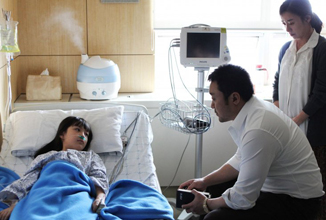 |
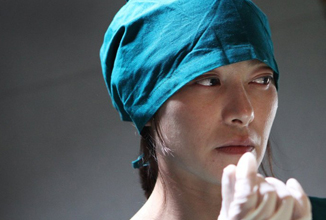 |
Finally as far as narrative is concerned, the question of what society's (i.e. male) attitude towards - and treatment of - Young-nam and her daughter's plight has on Young-nam's psyche could be said to be raised in both her decision to take vengeance on the wrongdoers around her and also in her actions subsequent to the revenge. I, for one, found myself asking how much she had changed as a person over the course of her character arc and how much the definition of justice and/or morality had altered in her mind. Many films detailing stories involving revenge state the idea "become a monster to catch a monster". Whether that is ultimately also the case for Young-nam, I'll leave for you to decide.
Cinematically, Azooma is again adept at the same time as suffering from revenge element related problems. Throughout the film, director Lee Ji-seung intersperses music-free present-day scenes with musically accompanied flashback moments (some dreamlike in nature, using full, vibrant colours; others nightmarish, with subdued, almost sepia, tones) using a non-linear timeline to not only add tension and intrigue but also to accent the increasing fracturing of Young-nam's mind as her every effort to get justice or even be listened to pushes her to evermore desperate measures. All of this works incredibly well with the understated musical score - one moment warm and nostalgic, the next subtly morphing to dark and painful - adding yet further to proceedings but while pacing is scene-by-scene well timed, overall it's where the film falls: Many of you reading this review will be fully aware of the recent prevalence in Korean films lasting two or more hours, often with a pivotal narrative moment occurring at virtually exactly the one hour mark. That one-hour watershed (if you will) is also deliberately and noticably prevalent in Azooma, almost to the very second (serving as the beginning of Young-nam's decision to take revenge) and, as such, it strongly feels like a halfway point from which the vengeful narrative second-half focus will stem. However, as already mentioned, the total running time of Azooma is only an hour and a quarter, leaving both the revenge and subsequent conclusion to be undertaken in the ten short minutes before the credits roll.
Again, I'm aware that revenge alone is not the core of Azooma but, again, I attest that it overshadows to the extent that it feels like it is and, pacing-wise, we're once more largely left with Azooma appearing to be in a race to reach the finish line at breakneck speed.
Cast:
Azooma is Jang Young-nam's film from start to finish, period. Despite a long and noteworthy acting career her portrayal of the film's lead character is her first starring role and she gives a phenomenal performance throughout. If part of Jang Young-nam's intention was to prove that casting her as the lead in Azooma was the right decision, almost every frame of her performance does that with aplomb and more.
Of the other cast members, Don Lee's portrayal of Detective Ma stands out the most, largely as his character is given far greater screen time than the rest but all involved give accomplished performances throughout, regardless of whether their roles are large or small.
Summary:
At its core, 'Azooma' is a critique of Korean society at large; a dissection of injustices in the name of procedure; and lingering patriarchy within an ever-changing male/female cultural balance. However, the decision to focus the narrative culmination on suddenly chosen revenge, almost as catharsis, leaves 'Azooma' rather teetering between being an overly rushed revenge genre film and an insightful dramatic thriller.
Cast: Jang Young-nam, Don Lee, Hwang Tae-kwang, Bai Song-woo, Lee Jee-hee
Directed by: Lee Ji-seung
|








